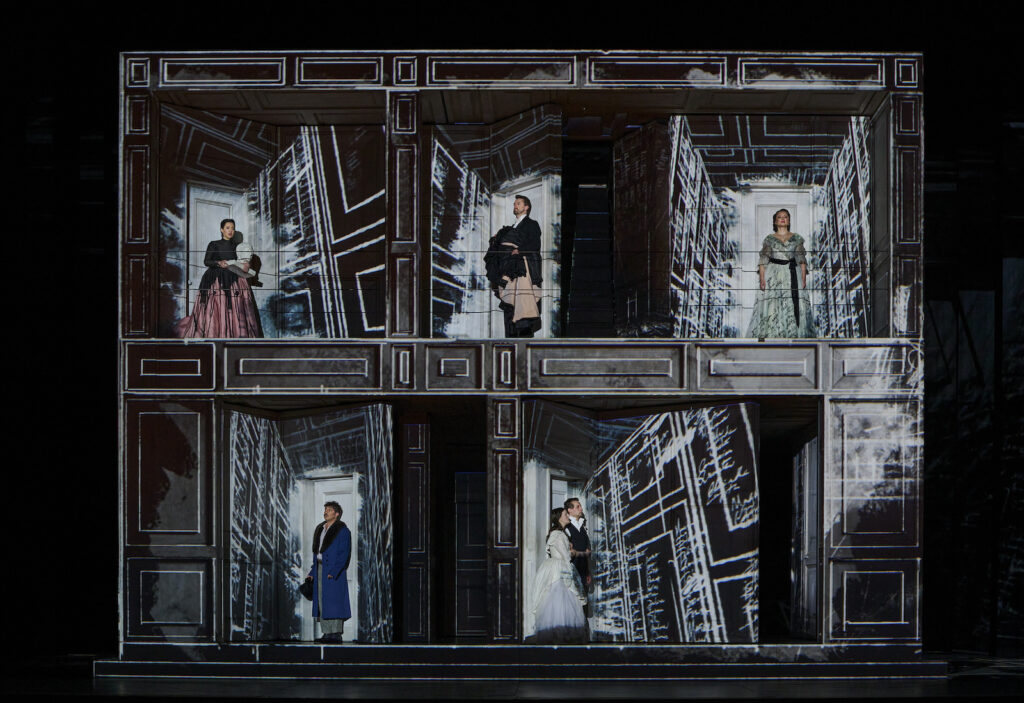Don Giovanni, Wolfgang Amadeus Mozart’s timeless 1787 masterpiece, as witnessed by the Canadian Opera Company’s most recent iteration currently playing at Toronto’s Four Seasons Centre, both challenges and thrills, an intriguing declaration of artistic intention stunningly revealed via startlingly transformative stagecraft. Embedded in the relentless outpouring of projected imagery, conceived by Luke Halls, splashed across designer Es Devlin’s set — a sprawling byzantine maze of blank doors and precipitous stairways and claustrophobic rooms — is the notion of the supernatural as active agent. By murdering the Commendatore, father to his latest womanly object of prey, Giovanni unleashes the occult, his forbidding Spanish palacio assuming active shape — monumental avenger, eerie architectural tormentor.
Seen from a more overt psychological point of view, however, the theatrical dynamics on show here — a scrawled catalogue of named conquests (quite possibly all mille tre plus, given the seemingly endless list), gritty graffiti, walls dripping blood — become less a function of some externalized nemesis, more a consequence of Don Giovanni’s subconscious. Profligacy as prophesy, an unheeded warning triggered by wantonness. It is not a particularly novel trope. Or necessarily a full accounting.
George Bernard Shaw famously theorized that by suppressing all semblance of conscience, Mozart’s obsessive anti-hero assumes an almost mythical identity, battling to break down any number of metaphorical doors (see above), however barred to possibility, a superhuman drive for dominance in the clash of society vs the individual.
Don Giovanni quite intentionally blazes a blistering trail to hell, one of his own creation, moral danger signs be damned. The impulse to self-destruction and doom has long smouldred within him.
Existential curse. A plague of inner demons. Director Kasper Holten constructs something of a seriously thoughtful conundrum. A Don Giovanni of both unsettling vision and forbidding darkness.
Theoretical analysis aside, the wealth of explicit musical values adorning this show, overture to anguished final recit, are an absolute. Irrefutable. Soaring.
Inhabiting the title role, bass-baritone Gordon Bintner confronts us with a Don Giovanni of formidable physicality, charismatic, devilishly handsome, a dangerously enticing predator, his voice rolling and robust. Frequently compelled to sing from the comparatively narrow leading edge of the FSC stage, an inevitable consequence of the immense rotatable set towering behind him; essentially left to close the proceedings, alone and abandoned, in the absence of the opera’s concluding quintet, Bintner delivers a masterclass in centredness, a quality much in evidence throughout his performance. Mozart’s silky smooth paean to seduction, Là ci darem la mano (“There we’ll take each other’s hand”), later followed by the lilting Deh, vieni alla finestra (“Oh, come to the window, my lovely”), in Bintner’s steady hands, are irresistible in the extreme.
Singing Leporello, baritone Paolo Bordogna delivers a bluntly sardonic, broadly comic portrayal of Don Giovanni’s ubiquitous servant, avoiding any notion of henchman as alter ego — a not uncommon characterization in other productions, Rhombus Media’s 2001 film release, Leporello’s Revenge, a notable example. Slouched, indifferent, rumpled duster hanging from his less than heroic frame, crushed hat in place, Bordogna’s Leporello is very much master of his own quixotic destiny; an irreverent, long-suffering clown.
Sopranos Mané Goloyan, Anita Hartig and mezzo-soprano Simone McIntosh appear as Mozart’s infinitely human, vocally dynamic operatic triumvirate, Donna Anna, Donna Elvira and Zerlina respectively, each gifted with multiple, intensely dramatic solo turns in the spotlight. Hartig positively sizzles in her fiery airing of Elvira’s Ah! chi mi dice mai (“Who can tell me where to find the rogue”), her dusky timbre red hot with rage. Goloyan, gifted with a somewhat more silvery instrument, is no less explosive in Donna Anna’s ferocious vengeance aria, Or sai chi l’onore (“Now you know who tried to dishonour me”). Zerlina’s coquettish Batti, batti, o bel Masetto (“Beat me, my darling Masetto”), as rendered by McIntosh, assumes a gently ironic tone, a whiff of sarcasm underlying her bright, unclouded stylings, a welcome attempt to dispel at least some of the problematic misogyny still clinging to the piece after more than 200 years.
Tenor Ben Bliss is Donna Anna’s ever-faithful betrothed, Don Ottavio, protective and devoted and, as Bliss makes ringingly clear in his gorgeous rendition of Mozart’s intensely heartfelt, Come mai creder deggio…Dalla sua pace (“How can I believe that a nobleman could be guilty of so black a crime!”), capable of deep, abiding tenderness.
Bass-baritone Joel Allison is an appealing, untypically purposeful Masetto, Zerlina’s jealous fiancé. Bass David Leigh is a suitably commanding Commendatore, appearing in several altogether original non-singing walk-ons, as a grim, ghostly visitor to Don Giovanni’s cursed abode, partnered by a faceless cohort of female apparitions.
The Canadian Opera Company Orchestra, under the leadership of conductor Johannes Debus, triumphs in a gloriously exuberant performance of Mozart’s tirelessly animated score, piano continuo assertive and eager, strings particularly lush.
Though radically reduced in number, presumably in the interest of heightened theatrical intimacy, the Canadian Opera Company Chorus, as always, thoroughly delights.
A remarkable Don Giovanni, haunting and haunted. A unique synthesis of innovation and classicism. Captivating.


